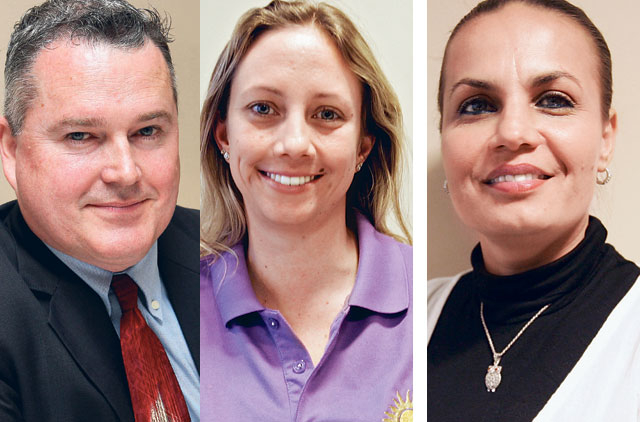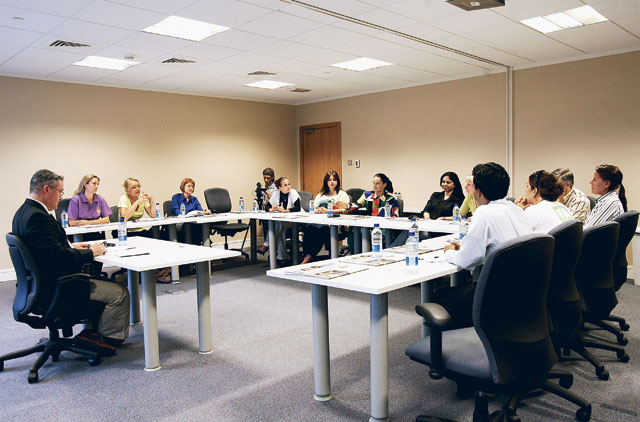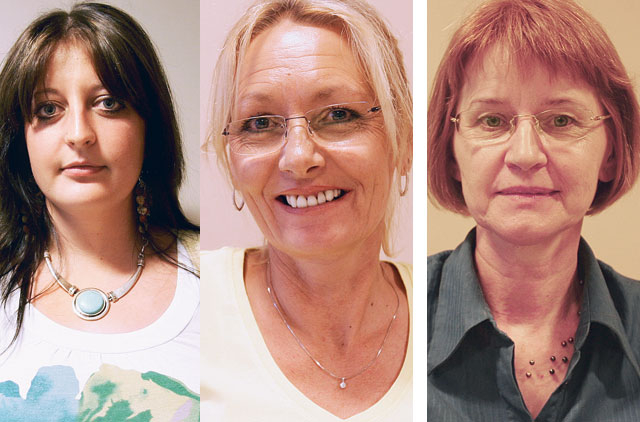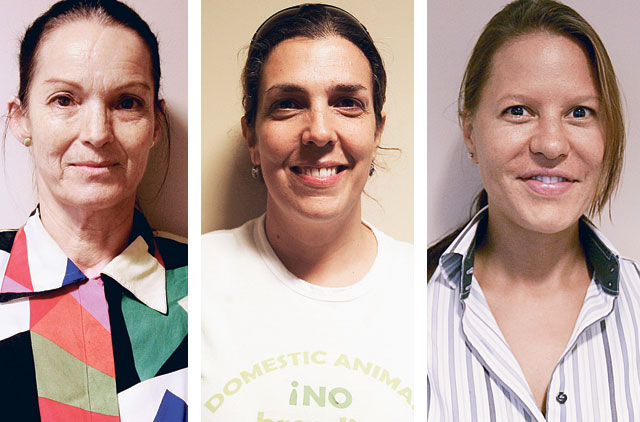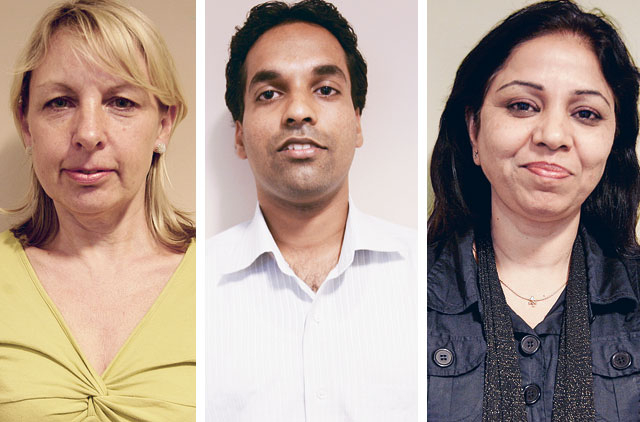
Ursula Manvatkar: Rescued animals which were abandoned after Jebel Ali Village in Dubai was slated for demolition.
Alan Godfrey: 60-year-old British real estate investor and animal lover. Image Credit: KAREN DIAS /Gulf News
With some crucial animal welfare issues being raised in the newspaper in the recent past, Gulf News decided to invite animal activists, experts as well as animal welfare enthusiasts to the newspaper's head office to discuss the issue. The participants came from varying backgrounds and put forth their own views on what the problems and solutions were in giving animals their deserved rights. For the first time, it was an all-reader exercise, with Dr Don Love, a Sharjah-based mass communications professor and Gulf News reader, playing the guest moderator for the debate. Here are some excerpts:
Dr Don Love: [To start the debate,] what’s the problem that we should address?
Petra Khadija Müller:
Import of animals, puppies and kittens, should be reduced. I think that is one of the biggest objectives that should be achieved. And control of wild breeding, because we have too many breeders … and while we definitely need kittens and cats and dogs, because we are animal lovers, it should be controlled and done in a professional way.
Sudha Kathuria:
Another concern is the health facilities. That is one thing that definitely causes concerns. We have [some clinics in the UAE] but what we really find is stray cats all around the UAE. It doesn’t have to be an organisation, it has to be me, you, everyone [who needs to help animals].
Vijoy VJ:
One thing I would like to point is that most of the animals that are not adapted to live in this part of the region … we should rescue those animals first.
Hilke Meyer-Reumann:
For wild animals that law is in place, it just doesn’t get followed.
Montserrat Martin:
This is what we are trying to do right now with Dubai Municipality. If we all go back and press to enforce the law, 90 per cent of the problems will stop.
Barbara Soper:
I agree. If the law is enforced then you won’t have the breeding and the import. If people are punished, people will stop doing it. Half of them don’t know the laws because no one talks about it, and the other half who do know the law get away with it because they think that they can’t be caught.
Petra Khadija Müller:
I just want to say something about dogs. Unfortunately, when you talk about the farms, they have dogs always [tied]. And these dogs are in the heat, they get water, they get food, but they cannot walk and they cannot run. And I discussed this with them [the farm owners], asking them: “why are you doing this?” They said that it is not allowed to let them run [in the farm] ... If the dog runs then the municipality has the right to shoot them. So, [I ask] how are you going to protect your farm? The dog can’t just bark. Take something else then, like a detector, not a live animal. It is so unfair, in this heat all of us know, these animals cannot survive.
Lesley Muncey:
The law in itself is quite nice, but what has happened is that they’ve made it too quickly and released it, but they can’t implement it. The municipality should have the right to confiscate animals in a correct manner. There is a protocol that you have to use. You must go and warn the person who is possibly abusing the animals, you must get evidence. Then, from there, they have to leave a notice and give these people a chance to do something about how they are treating the animals. You’ve got to educate them first.
Aisha Kelaif:
Because often they might not even know that they are doing something wrong.
Joy Godfrey:
For the people with dogs there are not many parks, where you can take them. It must be pretty difficult for dog owners to exercise their animals and give them a healthy lifestyle.
Lesley Muncey:
As animal lovers, we don’t have to stick to just us [the organisations]. We have to get out to the public and we need to do petitions. But, we also need to educate the public to not let their dogs defecate everywhere.
Barbara Soper:
We also need responsibility from pet shop owners who should [check if buyers know enough about the animal].
Hilke Meyer-Reumann:
Like in Germany, you have to pay dog tax, you have to get a dog licence, which — to get — you have to give a written test, an oral test and get doggy behaviour lessons.
Lesley Muncey:
The problem is that if you go to any of the pet shops, the owners don’t know themselves about animal care.
Dr Don Love: What aspects of education should we emphasise?
Vijoy V. J.:
I would say that please ensure that [the import of] all the animals that are not suitable for this environment should be stopped immediately.
Aisha Kelaif:
Exactly. Of all the 122 animals living with me right now, 99 per cent are exotic animals.
Lesley Muncey:
If you start with children, they then educate their parents. You’ve broken the chain.
Ursula Manvatkar:
What we need is stricter implementation of laws, backing such education campaigns. Unless we do that [nothing is going to happen].
Aisha Kelaif:
Some can’t take [the animals back home] because of their situation. It is not their fault. The situation does not allow them to take the animals with them.
Montserrat Martin:
We have clinics with cages filled with animals left outside their doors. If you are leaving the country why don’t you make the right arrangements? First of all, don’t buy a dog. Foster one.
Lesley Muncey:
We are here [to help animals] so people phone us for help. They go: “We don’t care, because well, someone [else is] going to help.” No, this is your responsibility.
Dr Don Love: some would argue that a reason for this abuse is that [HEALTHCARE] prices [are very high].
Barbara Soper:
But, honestly, how much do they pay for that puppy? Dh12,000? [Later, people think of the costs when they are about to leave], well they should have thought of that before.
Petra Khadija Müller:
We are not going to change the world. [The solution is to] stop importing kittens and puppies.
Montserrat Martin:
If I am going to Japan for two weeks, I can see if my neighbour can look after my dog. So that when they go on a vacation I can take of their [pet].
Ursula Manvatkar:
Like Petra rightly said. We should stop importing animals. We already have such a pool of abandoned animals to choose from. People should be taught that they are animals regardless of what colour or size they are.
Giselle Orsmond:
The question was whether the prices were too high, and I think that they are not. I think it is an incorrect perception.
Dr Don Love: would you report SOMEONE?
Barbara Soper:
Why would I report? There is no naming [and shaming].
Lesley Muncey:
There is. Someone reported how my neighbour was mistreating his Great Dane and the municipality came around in an hour and warned him.
Dr Don Love: why should people care?
Ursula Manvatkar:
They should care as much as they care about human beings. They have equal rights.
Vijoy V. J.:
It is each one of our responsibility to look after them, and keep them in a good condition. Responsibility matters.
Montserrat Martin:
Any action we take will have an impact. We should care.
Barbara Soper:
I agree. It is just decent to respect all life forms.
Alan Godfrey:
I don’t think they would! You all have a heart of gold, but people do not care.
Joy Godfrey:
Well, animals don’t have a voice. And all these problems are caused by humans. I just think we are the cause and it is up to us to help them out.
Siân Robinson:
I think it is all about trying to make people grow a conscience and take responsibility.
Aisha Kelaif:
I think we should care because if we don’t have animals in this world, it would be a very sad place.
Michael Ohman San Juan:
For me it is about feelings.
Giselle Orsmond:
The other thing is that most non-animal lovers think that we animal lovers don’t care enough about people. We do, [we just care for animals, too]
Lesley Muncey:
It is an ecosystem and if we’re actually pushing animals out of this system it will come back and bite us. I think that is something people don’t realise.
Hilke Meyer-Reumann:
They do give us unconditional love, so they should not have to suffer because of our ignorance. There are a lot of people who can help you. if you are living in a community that cares more about animals, I think it makes people more helpful towards each other as well.
Conclusion
• Education is the need of the hour – people need to be educated about animal rights and animal welfare.
• The laws already in place need to be enforced to make sure cases of animal abuse stop.
• More reporting in media on animal-related stories and issues.


